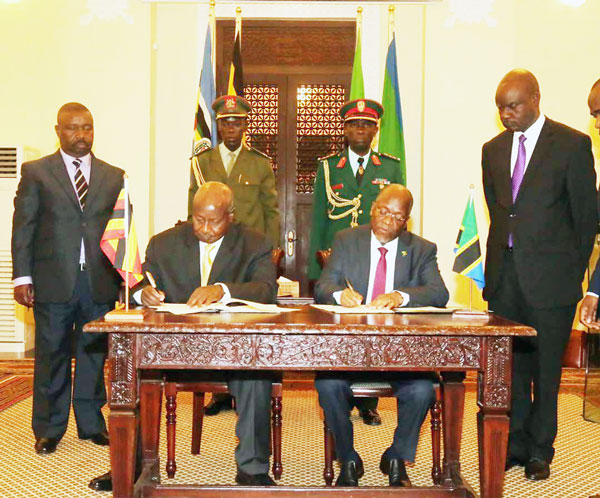
Uganda and Tanzania Sign Deal for Major Oil Pipeline
The new 1,400 km East African Crude Oil Pipeline and resulting oil boom in Uganda could bring significant problems to the region. We only have to look at Nigeria and its 60 year spiral of pollution, corruption and violence to know that often oil is a curse rather than a blessing.
Despite the protests at Standing Rock there is a pipeline boom in North America, leading to countless new frontline fights by environmental and indigenous activists.
According to an analysis by the Oil and Gas Journal, some 4,800 miles of new North American crude oil pipelines are being built this year. But in all, over the next few years, nearly 32,000 miles of North American pipelines are planned or under construction.
As an investigation by the Daily Beast notes: “Unshackled by Congress and enabled by the most oil-friendly president in decades, the industry aims to transform the American landscape with tens of billions of dollars in new pipelines, storage depots, and export terminals.”
The Beast points out that “pipeline battles are shaping up in more than a dozen states, including South Dakota, Nebraska, Iowa, Minnesota, Massachusetts, New York, Oklahoma, Texas, Louisiana and Florida.”
Lena Moffitt, director of the Sierra Club’s Beyond Dirty Fuels campaign tells The Beast that the oil industry is “racing to lock in continued demand for product via this infrastructure (to) get these fossil fuels to our coasts as fast as possible.”
But it is not just in North America that the oil industry is rushing to get oil to the coast.
Yesterday, the Ugandan President Yoweri Museveni and his Tanzanian counterpart, President John Magufuli, signed an executive order to proceed with what is known as the 1,400 km East African Crude Oil Pipeline, which will transport oil from Uganda via Tanzania to the coast at a cost of $10 billion. Once finished the pipeline will be the longest electrically heated pipeline in the world.
The Ugandan oil fields are being developed by French company Total, UK company Tullow and China’s Cnooc. Tullow estimates the Uganda fields will produce 1.7bn recoverable barrels of oil. At full production, the fields are expected to produce up to 230,000 barrels a day.
According to the Financial Times, under pressure from Total, Museveni routed the pipeline though Tanzania after its President, Magufuli offered a much cheaper deal than his Kenyan counterpart.
Museveni said that he was happy to have “concluded all the outstanding issues concerning the oil pipeline agreement …. This project will benefit Uganda and Tanzania. It is one of the strategic ways for the integration of the East African Community and will strengthen our relationship”.
But the pipeline and the oil boom could bring significant problems, and we only have to look at Nigeria and its 60 year spiral of pollution, corruption and violence to know that often oil is a curse rather than a blessing.
Uganda could face many of the same problems.
As the Financial Times points out: “Considering Uganda’s historic reputation for endemic corruption, local analysts and activists are sceptical that everything will go smoothly”. Six years ago, I asked the same question about the oil deals in the country, in a blog entitled: “Was Ugandan oil deal corrupt?”
Moreover, the area where the oil is being developed, Lake Albert, in Uganda has been described by Global Witness as “one of the most ecologically diverse regions on the planet”
Regulation to keep the industry in check is largely non-existent. In a report on the oil industry in the country two years ago, the Oxford Institute for Energy Studies noted: “To date, companies are basically self -regulating. Uganda’s National Environment Management Authority is underfunded, understaffed, and lacks political authority.”
More recently, a field officer with the Africa Institute for Energy Governance, Sandra Atusinguza, warned that Uganda was still “playing catch up with her envonment”.
She argued that setting up of the infrastructure surrounding the oil and gas industry, including the pipeline, “will result in destruction of the environment and, as such, environmental regulations are direly needed … .This is especially important because you know that as a country and people, we are entirely dependent on nature and we need to protect it.”

